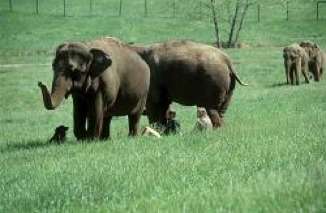Encroachment by palm oil plantations into elephant habitat have greatly increased conflicts between humans and elephants. Now the Indonesian government is to double the size of a national park that is one of the last havens for endangered Sumatran elephants and tigers.
Tesso Nilo National Park was created in 2004 with 38,000 hectares of forest. Today's declaration will increase that number to 86,000 by the end of this year.
"This is an important milestone toward securing a future for the Sumatran elephant and tiger," said Dr. Mubariq Ahmad, WWF-Indonesia's Chief Executive. "To ensure the commitment is effectively implemented we must redouble our efforts to eliminate poaching and illegal settlements within this special forest."
With more than 4,000 plant species recorded so far, the forest of Tesso Nilo has the highest lowland forest plant biodiversity known to science, with many species yet to be discovered.
WWF has been supporting the government effort to extend and protect the park as the last block of lowland forest in central Sumatra large enough to support a viable elephant population. About 60 to 80 elephants are estimated to live there, along with 50 tigers.
Tesso Nilo forest is also an important watershed for more than 40,000 people living in the surrounding 22 villages.
"Tesso Nilo is still under serious threat from illegal activities, but if we can protect the forests there it will give some of Sumatra's most endangered wildlife the breathing room they need to survive," Dr Ahmad said.
WWF helped establish the Tesso Nilo Community Forum, run by all 22 local communities living in the buffer zone of the national park. The forum supports joint actions to protect the Tesso Nilo forest and gives the communities a unified and more influential voice in park management.
WWF is working with local communities that suffer from human-wildlife conflict as a result of disappearing forests in the province. WWF also promotes the planting of buffer crops that are not attractive to elephants.










Be the first to comment